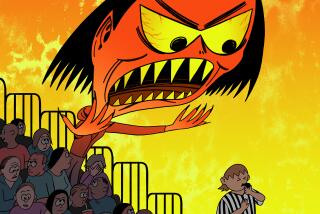Parents Can Make It Hard on Coaches
Aside from being a mediocre salesman, Willy Loman, one of the great tragic characters in American literature, also suffered from what might be called the “Little League Syndrome.”
Loman, the protagonist of Arthur Miller’s Pulitzer Prize-winning play, “Death of a Salesman,” was an overbearing father who so greatly encouraged his son Biff’s success in high school athletics that Biff’s academic and character development suffered as a result.
Years later, when Biff confronts his father with the awful truth that the younger Loman was nothing more than a common thief, the elder Loman still can’t believe that his offspring is capable of any wrong.
“I am not a dime a dozen!” Willy pathetically shouts in the play’s climactic scene, “I am Willy Loman and you are Biff Loman!”
Though Loman’s attitude is extreme, it nonetheless shows what can happen to parents and their youngsters caught up in the Little League Syndrome.
The Little League Syndrome, according to Costa Mesa clinical and sports psychologist Richard Lister, occurs when parents try to overcome their own deficiencies by living through the glory of their children who compete in athletics, such as Little League or prep football.
“There’s a fine line between being zealous and over zealous and when that happens, it kills the interest for the kids involved,” Lister said. “The parents end up wanting the glory more than the players themselves.
“With Orange County being one of the more upwardly mobile areas in the United States, you have many successful people here who want to pass the torch (of success) on to their children.”
Robert Metz, principal at Mission Viejo High School, said, “Our area is a community that is quite accomplished and the expectations by parents of their children is high.
“At the same time, in my five years here, I’ve had few parents come to me as principal and complain about who the coach plays. The feeling I get is that the parents simply want the best coach possible to work with their kids.”
By the nature of the job, high school administrators must walk a fine line between supporting the coaches that they hire and satisfying the community.
Occasionally, such administrators find themselves personally able to see high school athletics from both the school’s and a parent’s viewpoint.
Last week, for example, Ron Sipple, Troy High School athletic director, watched the Warriors play against El Dorado, where his son Doug is a starting running back. And the same night, Dr. Scotty McTaggart, La Quinta principal, watched the Aztecs play Foothill, where his son John is a running back.
At Foothill, the football program has carried parental involvement right down to the playing field, as each week two parents are allowed to watch the game from the sideline.
For most parents, according to Lister, high school sports offer a vicarious thrill that is difficult to duplicate in most social activities.
For example, a parent not only gets to see a son score touchdowns on Friday night, but the next day, gets to read about it in the newspapers. Then, upon returning to work Monday morning, they are likely to get congratulations for his son’s performance from his co-workers.
Pretty heady stuff, particularly for parents who were not great athletes themselves.
“We’ve had a lot of success at El Modena through the years, so it is hard for us (parents) to take a loss,” said Karen Bauer, a mother who has had three sons play for the Vanguards.
Jack Snow is one parent who had his share of glory as a wide receiver with Notre Dame and the Los Angeles Rams. His son J.T. is the Los Alamitos quarterback. Snow said that he and his family attend the games as much for the entertainment as to see his son play.
“There’s a certain excitement about high school football,” Snow said. “Our daughter Stephanie is a song girl, the band is playing, there’s a lot of yelling and screaming. It’s just fun to be there.”
The elder Snow said he does his best not to be an “armchair quarterback” when he watches his son play.
“You can pick them out real easily,” he said. “They’re usually yelling the loudest.”






